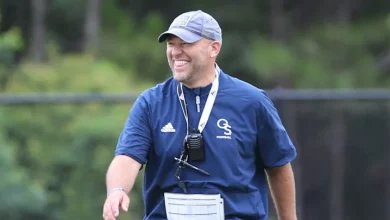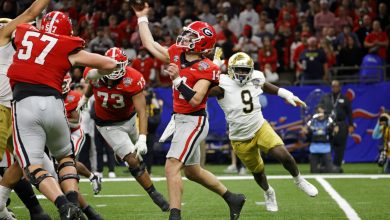Dolphins legend Dan Marino questions Aaron Rodgers’ mindset, expressing concern over his indecision between signing with the Steelers or opting for retirement.

As another NFL offseason progresses, one name continues to dominate headlines: Aaron Rodgers. The 41-year-old future Hall of Famer has yet to make a final decision on whether he will sign with the Pittsburgh Steelers — a team publicly courting him — or hang up his cleats for good. The delay has stirred a flurry of speculation among analysts, fans, and former players alike. But it was the voice of Dolphins legend Dan Marino that most recently cut through the noise, raising pointed concerns about Rodgers’ mindset and his commitment to the game.
“I respect Aaron, no doubt,” Marino said during a candid interview on The Huddle podcast. “But at some point, indecision becomes a decision. If you’re this hesitant about coming back, especially to a storied franchise like the Steelers, you’ve got to ask yourself: are you still mentally in it?”
Marino’s Message: Football Demands Clarity
Marino, a quarterback synonymous with toughness, grit, and laser focus during his 17-year career with the Miami Dolphins, isn’t known for making inflammatory comments. His critique of Rodgers wasn’t personal — it was reflective of a broader concern about athletes clinging to the spotlight while wrestling internally with the fear of letting go.
“There’s no shame in walking away,” Marino continued. “But the game deserves players who are all-in, not half-in and half-out.”
The implication of Marino’s words reverberated through the NFL world. Was he questioning Rodgers’ passion for the game? His mental preparedness? Or was he simply voicing what many front offices and locker rooms already suspect: that Rodgers, as great as he has been, may no longer possess the mental resolve required to lead a team deep into the postseason?
Rodgers: The Artist, the Enigma
To understand the complexity of Aaron Rodgers’ decision, one must first understand the man himself. Rodgers has always walked his own path — equal parts competitor, philosopher, and provocateur. Throughout his career, he has prioritized introspection and intellectual exploration as much as football accolades. His ayahuasca retreats, public feuds with management, and polarizing media appearances have often overshadowed his brilliance on the field.
Now, as he sits on the precipice of one final run — with the Steelers offering a clear opportunity to start and compete — Rodgers seems paralyzed by the weight of the decision. This paralysis, Marino argues, could indicate a deeper uncertainty about his identity and desire to play.
“I just worry he’s chasing something that isn’t there anymore,” Marino said. “If you have to think this hard about coming back, maybe your heart’s already moved on.”
Pittsburgh’s Position: Waiting Game or Strategic Play?
The Steelers, for their part, are in a tricky spot. Head coach Mike Tomlin has repeatedly stated that they’re evaluating all options, but insiders believe the team has made a serious push to lure Rodgers to Pittsburgh. Their roster, featuring a stout defense, emerging skill-position talent, and a solid offensive line, is tailor-made for a veteran quarterback to step in and compete right away.
From a football standpoint, Rodgers fits. But from a cultural and leadership perspective, there are questions. Can a quarterback who seems unsure about playing truly galvanize a locker room filled with young players trying to find their footing? Will the Steelers, a team known for continuity and mental toughness, risk their culture for one or two years of Rodgers magic?
Tomlin, known for his ability to manage personalities, could be Rodgers’ ideal coach. But even he may not be able to overcome the inherent tension of a player who isn’t fully committed.
Mentality Matters in the Twilight
Marino’s own experience lends credibility to his concerns. He played every snap of his career with the Dolphins, enduring multiple surgeries and late-career struggles, but never wavered in his commitment. He ultimately retired after the 1999 season, walking away quietly and without regrets.
“You’ve got to know when it’s time,” Marino said. “I knew. I didn’t need to be convinced. And that’s what worries me here. If Aaron’s still trying to convince himself, then maybe it’s already too late.”
Marino isn’t suggesting Rodgers lacks talent — far from it. But in today’s NFL, where preparation, leadership, and mental acuity matter as much as physical gifts, Marino believes a wavering mindset can be dangerous.
“You lose 1%, and that’s enough to miss a read, take a sack, or throw a bad pick,” Marino said. “That’s the difference between 10-7 and 7-10.”
Legacy on the Line
Rodgers’ resume speaks for itself: four MVPs, one Super Bowl ring, and a career filled with jaw-dropping throws and improbable comebacks. But in recent years, his postseason performances have been uneven, and his leadership style has drawn criticism. Some argue that another strong run could elevate him into even rarer air among NFL greats. Others believe his legacy is already intact — and at risk if he returns half-heartedly.
“Legacy is tricky,” Marino noted. “You can cement it by walking away at the right time, or you can erode it by staying too long.”
Rodgers, by most accounts, is not chasing stats or records. He’s chasing purpose. But that search — admirable as it may be — could be incompatible with the demands of a modern NFL season.
The Intangibles: Leadership, Locker Room, and Buy-In
No team signs a 41-year-old quarterback without expecting leadership. But how do you lead when you’re undecided? This is perhaps the crux of Marino’s critique. Rodgers’ indecision sends a message — not just to the media or fans, but to potential teammates. In a locker room, where belief is as vital as execution, that hesitation can trickle down.
“You can’t lead from the middle,” Marino said bluntly. “You’re either in the front of the pack, or you’re just another guy.”
For a young Steelers team trying to establish a new identity, leadership by example is critical. If Rodgers signs and then waffles midseason about his commitment, it could derail the team’s progress. On the flip side, if he commits fully, his experience and football IQ could be transformative.
The Market Reality
Rodgers’ unique combination of age, pedigree, and personality has made him a polarizing figure in NFL front offices. While a few teams — notably the Steelers and perhaps the Raiders — are intrigued by his talent, others are wary of the drama and distraction that can accompany his presence.
That reality also raises questions: Is Rodgers hesitating because he doesn’t truly want to play, or because he’s waiting for the perfect situation — one that may never come?
“There’s no such thing as perfect in football,” Marino reminded. “You take what’s there and go win.”
What Comes Next?
With mandatory minicamps approaching, the clock is ticking. Pittsburgh will need clarity soon — not just for logistical reasons, but to build the kind of cohesion that training camp demands. Rodgers’ decision, whenever it comes, will shape the direction of multiple franchises.
Marino’s words have sparked debate, but they’ve also introduced a sense of urgency. Indecision in football — especially at quarterback — can ripple outward in destructive ways.
“Aaron’s earned the right to do what he wants,” Marino concluded. “But football waits for no one. If you’re not in, the game moves on.”
Respect, Concern, and a Challenge
Dan Marino’s public comments about Aaron Rodgers’ indecision strike a delicate balance between respect and concern. He’s not disparaging Rodgers’ accomplishments — he’s challenging his mindset. In doing so, Marino has articulated what many in the league feel but hesitate to say: greatness isn’t just about what you’ve done; it’s about what you’re still willing to give.
If Rodgers decides to return and signs with the Steelers, he’ll need to silence doubts with action — with total buy-in, resilience, and leadership. If he walks away, he does so with a first-ballot Hall of Fame legacy intact.
But until then, as Marino suggests, Rodgers remains in limbo — not just between teams or decisions, but between legacy and uncertainty.









